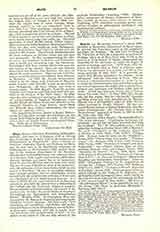

Mayr , BEDA, a Bavarian Benedictine philosopher, apologist, and poet, b. January 15, 1742, at Daiting near Augsburg; d. April 28, 1794, in the monastery of Heiligenkreuz in Donauworth. After studying at Scheyern, Augsburg, Munich and Freiburg im Breisgau, he took vows in the Benedictine monastery of Heiligenkreuz on September 29, 1762, studied theology at the common study-house of the Bavarian Benedictines in Benediktbeuern, was ordained priest on January 6, 1766, taught mathematics, philosophy, rhetoric, theology and canon law at his monastery, where he was also librarian and, for some time, prior. The last 28 years of his life he spent in his monastery, with the exception of four years during which he was pastor of Miindling. He was an exemplary religious and a popular preacher, but, as a philosopher, he was imbued with the subjectivistic criticism of Kant and, as a theologian, he was irenic beyond measure. In a letter to Henry Braun, superintendent of the Bavarian schools, he sets forth the opinion that a unification of the Catholic and the Protestant religion is possible. Braun published this letter without the consent of the author under the title “Der erste Schritt zur kiinftigen Vereinigung der katholischen and evangelischen Kirche” (Munich, 1778). In consequence Mayr was censured by the Bishop of Augsburg and temporarily forbidden to teach theology. His chief work, “Vertheidigung der natürlichen, christlichen and katholischen Religion nach den Beddrfnissen unserer Zeiten” in three parts (Augsburg, 1787-90), is equally irenic and permeated with the philosophy of Kant. It was placed on the Index in 1792 and ably refuted by the ex-Jesuit Hochbichler (Augsburg, 1790). Lindner (infra) enumerates 58 literary productions of Mayr. They include 21 dramas, four volumes of sermons (Augsburg, 1777), numerous occasional poems, and various treatises on philosophical, theological, and mathematical subjects.
MICHAEL OTT

